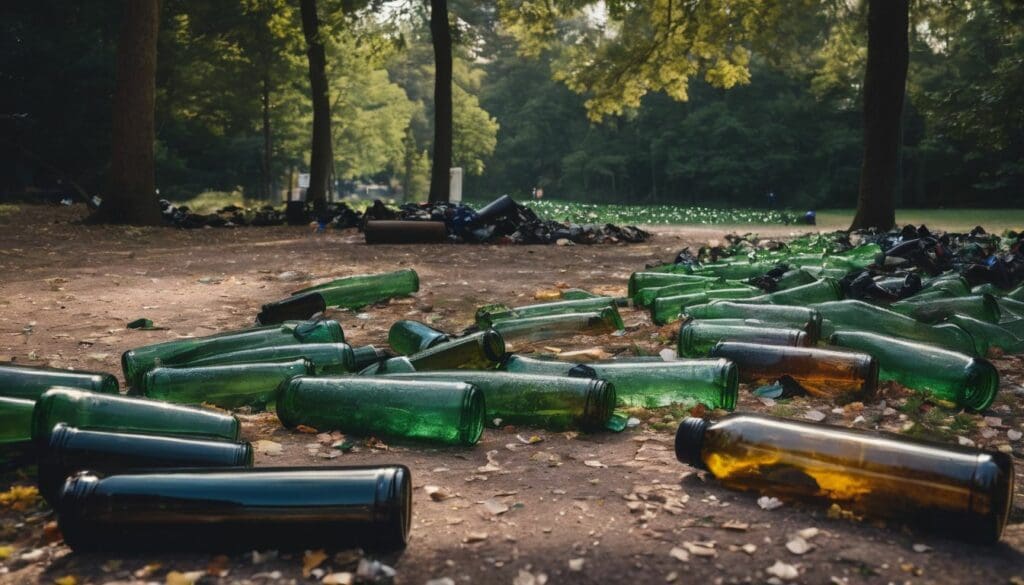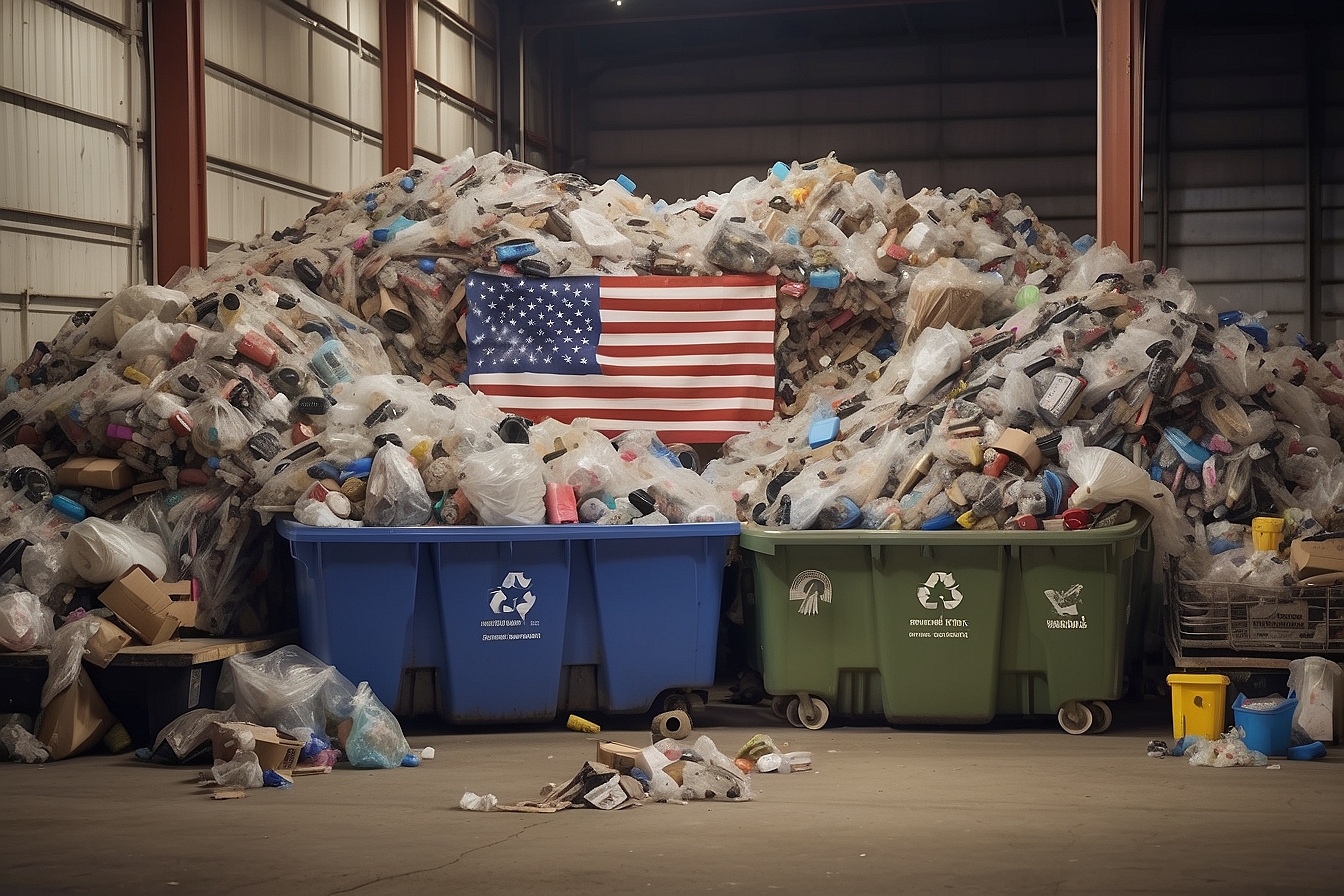As we stroll through our local parks and wander along the beaches, it’s impossible to miss the signs of our takeaway culture – discarded bottles strewn across these natural havens.
If you’re anything like me, your heart sinks a little each time you see this mess. It’s disheartening, isn’t it? Especially when we consider that globally, over one million plastic bottles are purchased every single minute.
Yet there’s a glimmer of hope on the horizon; our investigation into bottle deposit schemes has unearthed an effective strategy for revolutionising rubbish into something rather valuable, all while tidying up our cherished spaces.
Together, let’s delve into how we can reverse this wasteful tide and make a real difference for the sake of our environment!
Key Takeaways
- Bottle deposit schemes incentivise people to recycle by offering a refund for returned beverage containers, which leads to higher recycling rates and less litter.
- These programs encourage a culture of reusing materials, support circular economy principles, and reduce the need for raw material extraction.
- Clean recycling streams result from bottle deposit systems because they ensure returned containers are well-sorted, lowering contamination levels in recycled goods.
- The implementation of bottle deposit schemes can create local green jobs within communities, maintaining a healthy environment while boosting the economy.
- Participating in container deposit legislation drives consumer engagement with environmental conservation efforts and promotes responsible waste management practices.
What is a Bottle Deposit Scheme?
A Bottle Deposit Scheme is a system where consumers pay a small deposit when purchasing beverage containers, which they can later reclaim when returning the containers for recycling.
This encourages recycling, reduces litter, and promotes a circular economy.
Encourages recycling
We see bottle deposit schemes as a powerful motivator for recycling. By attaching a small deposit fee to each beverage container, we incentivise consumers to return their bottles and cans in exchange for their money back.
This simple yet effective tactic significantly increases the number of containers that are recycled instead of being discarded, turning empty drinks into valuable resources once more.
Our habits transform as we participate in these programs, fostering a culture where reusing materials becomes second nature. We take pride in knowing that every container returned is one less piece of litter on our streets and one more step towards environmental sustainability.
Through this act of resource conservation, not only do we protect the planet, but we also conserve energy needed to produce new containers from raw materials—benefits felt by everyone who cherishes our natural world.
Reduces litter
Container deposit schemes effectively reduce litter by providing an incentive for consumers to return containers for recycling. This leads to fewer bottles and cans being left as litter in public spaces, which helps keep our communities clean and free from visual pollution.
With the introduction of bottle deposit schemes, there is a noticeable decrease in the amount of beverage containers improperly disposed of in parks, streets, and waterways.
Bottle deposit systems also contribute to reducing plastic waste that often ends up as litter. By encouraging people to return their used containers for a refund, these schemes discourage individuals from discarding them haphazardly after consumption.
Promotes circular economy
Bottle deposit schemes are a practical solution to promote a circular economy. These systems encourage the reuse and recycling of beverage containers, reducing waste and conserving resources.
By providing incentives for returning used bottles, these schemes create a cycle where materials are continuously reused, supporting sustainable practices and reducing the need for new raw materials.
The implementation of bottle deposit schemes also supports local economies by creating green jobs in recycling facilities and promoting community involvement in environmental conservation efforts.
Such initiatives not only reduce litter but also actively contribute to the preservation of natural resources and energy conservation. Ultimately, bottle deposit schemes play an essential role in promoting a closed-loop system that benefits both the environment and society as a whole.
The Effectiveness of Bottle Deposit Schemes
Bottle deposit schemes have been proven to significantly increase recycling rates and contribute to cleaner recycling streams. They also play a vital role in the creation of local green jobs within communities.
Higher recycling rates
Container deposit schemes contribute to higher recycling rates, ensuring that more beverage containers are returned and recycled. This leads to a significant reduction in landfill waste while conserving valuable resources.
The implementation of bottle deposit systems has proven effective in increasing the overall recycling rates within communities, promoting a sustainable approach to waste management and resource conservation.
The introduction of container deposit legislation encourages individuals to actively participate in the recycling process, ultimately leading to cleaner and more efficient recycling streams.
Cleaner recycling streams
Bottle deposit schemes lead to cleaner recycling streams, benefitting the environment and conserving resources. Beverage containers are sorted efficiently, reducing contamination in the recycling process.
This separation of materials creates a higher quality of recyclables for manufacturers to use in producing new products, helping us conserve energy and reduce waste.
Deposit return systems also encourage consumers to recycle more responsibly. As people bring back their containers for refunds, it keeps these items out of landfills and incinerators.
Creation of local green jobs
Bottle deposit schemes create local green jobs, contributing to the economy and the environment. By establishing and maintaining recycling infrastructure, such as collection centers and processing facilities, these schemes generate employment opportunities for individuals in communities.
The sorting, cleaning, and processing of recycled materials also require a skilled workforce, further boosting job creation.
In addition to creating green jobs at recycling facilities, bottle deposit schemes support local businesses that manufacture or distribute reusable containers. This not only reduces environmental impact but also provides economic growth within communities through sustainable practices.
Conclusion
In conclusion, beverage container deposit schemes effectively encourage recycling. They also significantly reduce litter and promote a circular economy for the betterment of our environment.
By implementing bottle deposit systems, communities can enjoy clean recycling streams and create local green jobs while conserving energy and resources. With higher recycling rates and incentives, these initiatives undeniably contribute to a cleaner and more sustainable future for all.
FAQs
1. What are bottle deposit schemes?
Bottle deposit schemes, also known as container deposit schemes or the bottle bill, are systems where consumers pay a small deposit on beverage containers that is refunded when they return the empty container for recycling.
2. How do bottle deposit schemes help the environment?
These schemes promote environmental benefits by encouraging recycling materials, reducing litter, conserving energy and resources, and separating container materials for better recycling quality.
3. Do these deposits make a big difference in reducing litter?
Yes! Deposit return systems have been effective in litter reduction because people are more likely to recycle when there’s a financial incentive like getting their deposit back.
4. Are there machines that make returning bottles easier?
Reverse vending machines accept returned containers and issue refunds automatically, making it convenient for individuals to participate in recycling incentives offered by container deposit schemes.
5. Could bottle deposits affect how much soda or bottled water I buy?
While some worry that beverage sales might be impacted by adding a small cost upfront through a recycling deposit, many areas with these systems see no significant negative effect on sales due to environmental awareness and willingness to recycle.





